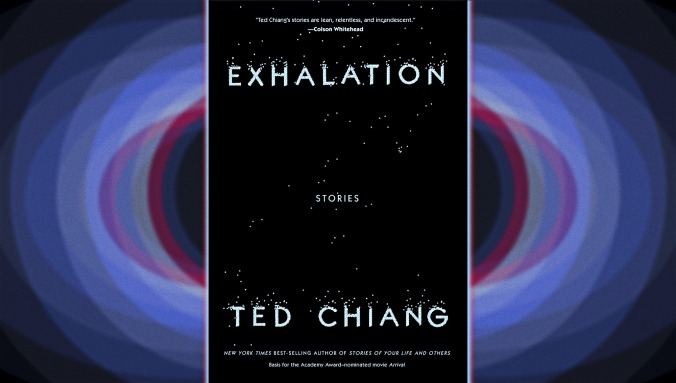Ted Chiang, the mind behind Arrival, returns with another awe-inducing sci-fi collection
Image: Graphic: Karl Gustafson
A handful of living science fiction writers have attained godlike status—N.K. Jemisin, Cixin Liu, and Ann Leckie, to name a few. But Ted Chiang is the only one who’s done it without writing a novel. In fact, he’s published far less than his neighbors on the genre’s current Mount Rushmore, usually just one short story every two years. But oh, his stories. They’re a religious experience.
If Robin Williams was a comedian’s comedian, Ted Chiang is a science fiction writer’s science fiction writer. He’s best known for his 1998 story “Story Of Your Life,” which the 2016 film Arrival was based on, but in between those iterations, Chiang won four Hugo, three Locus, and two Nebula awards—the sci-fi equivalents of Oscars, Golden Globes, and Emmys, respectively. His first eight short stories were collected in 2002’s Stories Of Your Life And Others, and the nine he’s written since appear in Exhalation, a moving book about fate and free will that is destined to become a literary landmark of the 2010s.
Like the fantasy writer Jeffrey Ford, Ted Chiang specializes in puzzle-box stories that click into place on the last page. Reading one of his stories feels like tracing a Gordian knot you don’t realize is perfectly symmetrical until the final turn. In Exhalation, which could be subtitled “Black Mirror For Optimists,” every story seems crafted with one objective in mind—pure awe.
It begins with “The Merchant And The Alchemist’s Gate,” an Arabian Nights riff about an Iraqi fabric merchant who stumbles upon a time-travel device in Baghdad. If he steps through the Gate of Years from the right side, he can visit “the Baghdad of twenty years hence.” If he steps through the left side, he can travel to the same spot twenty years in the past. It’s the book’s first of many quandaries over destiny and self-determination, since the alchemist warns the merchant, “using the Gate is like taking a secret passageway in a palace, one that lets you enter a room more quickly… [but] the room remains the same, no matter which door you use to enter.” The same theme continues in the book’s darkest story, “What’s Expected Of Us,” where a fidget spinner-esque device called a Predictor blinks green exactly one second before you push its button. For some, it’s a harmless toy, but for others it destroys the illusion of free will. “A third of those who play with a Predictor must be hospitalized because they won’t feed themselves,” the narrator warns.
On a lighter note, “Omphalos” concerns a religious archaeologist in an alternate universe where young-earth creationism was confirmed by secular science. The growth rings in trees, for instance, only stretch back some 9,000 years. But when new evidence suggests Earth might not be the center of the universe after all, she experiences a crisis of faith all too familiar in our own reality: the terror of free will in the sudden absence of fate. “Why did the primordial humans set about building civilization, if not out of a desire to fulfill divine purpose?”
The three longer stories in Exhalation are Chiang’s finest work to date. In “The Lifecycle Of Software Objects,” a Second Life-style game developer hires a zookeeper to raise newborn artificial intelligences clothed in animal avatars. Meanwhile, “The Truth Of Fact, The Truth Of Feeling” is a composite of two stories. In the near future, a new technology allows people to record, access, and share every moment of their lives. And in the past, a European missionary teaches a West African boy how to read and write, which makes a similarly dramatic effect on the way he sees and shares the world. “Writing let[s] you look at your thoughts in a way you couldn’t if you were just talking, and having seen them, you could improve them, make them stronger and more elaborate.”
But if anything in this book has a shot at becoming the next Arrival, it’s the 70-page novella that closes the collection, “Anxiety Is The Dizziness Of Freedom.” In the future, “prisms” allow people to communicate with alternate versions of themselves in parallel universes. Instead of wondering what your life could have been like had you made a different decision, prisms let you text, email, or Skype that version of yourself to find out. As with any technology, there are hidden costs. “[T]he quantum measurement that takes place when the prism is activated can still exert an effect on the outside world,” Chiang writes, “determining whether two oxygen molecules collide or whether they drift past each other.” Thus, courtesy of the butterfly effect, prisms aren’t just connecting realities—they’re changing them.
Chiang’s fiction isn’t for everyone—some stories, like the title track are essentially thought experiments that sound less like fiction and more like an essay. But every story works. Even “The Great Silence,” a five-page fable originally written to accompany a video art installation that juxtaposed the Arecibo radio telescope with its surrounding wildlife, is surprising and heartbreaking. Even “Exhalation” ends with an awe-inspiring crescendo.
Savor all nine of these stories. Read them one sitting at a time, somewhere still and quiet, and let them sink in. If we get a third Ted Chiang collection, it probably won’t be for another 15 years.